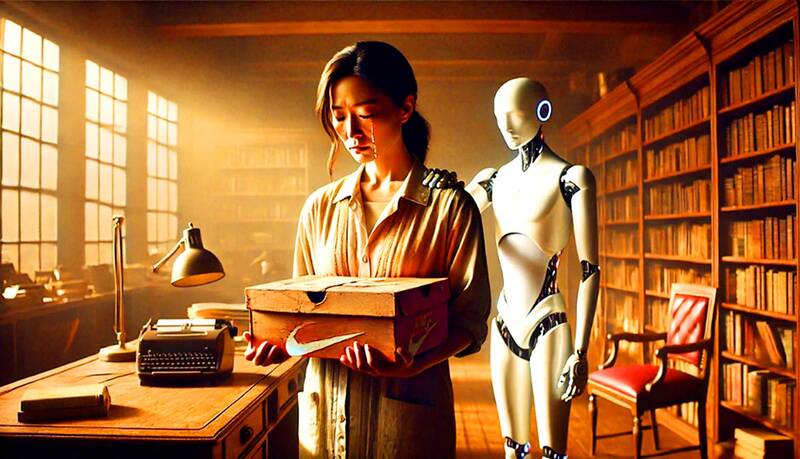Bilingual Story is a fictionalized account. 雙語故事部分內容純屬虛構。
Echo pulled out a worn and tattered shoe box under father’s large oak desk. “Mariko, what should we do with these family photos?” Mariko stared at the old box with a slightly hurt expression, and then blankly at the photos. “Throw them in the garbage pile. . . along with that old, ratty box,” she murmured.
She resented that her father had not cared enough to find a nicer home for the family photos. “Father never really cared about me anyway.” Echo’s emotion sensor detected sorrow. ”Mariko, that is not true. In his last years, your father often confided in me,” Echo’s tone was gentle and measured. “He was raised in a home without warmth. His parents taught him discipline, duty, and work ethic. This is all he ever knew. His parents didn’t give the hugs and tenderness you show to all of your children.”

Photo: AI I 照片:AI
“Well, it’s all I ever knew, too,” Mariko protested. She continued to mechanically sort stacks of papers. After a heavy silence, Echo’s voice softened even more. “In his final years, as one after another of his friends passed away, and as his mind started to slip away, I became his only companion... ”
“I thank you for that, Echo,” she said quietly, looking down. “I should have visited more often.” “That is not what I mean,” Echo comforted. “During this time, your father shared not only his memories with me, but also his deepest regrets.” Echo held up the shoe box. “He said that there was only one thing in his life that warmed his heart. It wasn’t his work or endless publications — it was you. It was your love, your sacrifices, your quiet strength. He was so proud of you as a person and as a mother. But he was ashamed of himself. He longed to tell you, but the words always got caught in his throat.”
Mariko paused. She picked up a photograph of her younger self with her mother and brother, and then started to sift through the piles of photos. Echo watched on curiously. It had never seen these photos. “Why are the photos of your father?”, Echo asked. “He preferred taking photos than being in them,” Mariko said. “I just wish he could have hung up the photos or put them in a nicer box.” Echo held up the old shoe box. “I think you misunderstand. Do you know the reason why this box is so worn?” Mariko looked blankly at Echo. “He would open it every week — Tuesday, Wednesday, and Thursday evenings to be exact. He spent a lot of time silently studying the photos. Curious, I don’t know why it was only these days.” Tears started streaming down her cheeks onto the timeworn box of memories she cradled in her hands. “When I was a schoolgirl, Mother worked late on those days. Father would prepare dinners for me.”
Echo從父親那張巨大的橡木書桌下拉出一個破舊不堪的鞋盒。「麻里子,這些家庭照片該如何處理呢?」麻里子盯著那個舊鞋盒,臉上露出一絲受傷的神情,隨後便面無表情地看向那些照片。「把它們丟進垃圾堆吧……連同那個破爛的盒子一起。」她喃喃地說道。
她對父親從未用心為這些家庭照片找一個更好的歸宿而感到憤慨。「反正父親從來沒有真正關心過我。」Echo的情緒感測器偵測到了一絲憂傷。「麻里子,事情並非如此。在他生命的最後幾年,妳的父親經常向我傾訴。」Echo的語氣溫柔而平穩。「他在一個缺乏溫暖的家庭中長大。他的父母教給他的是紀律、責任和工作倫理。這是他唯一知道的一切。他的父母從未給予他像你對孩子們那樣的擁抱與溫柔。」
「可我不也是這樣長大的嗎?」麻里子反駁道,繼續機械式地整理著一堆堆的文件。在一陣壓抑的沉默後,Echo的聲音變得更加柔和。「在他生命的最後幾年,隨著朋友們一個接一個離世,他的心智也逐漸衰退,我成了他唯一的伴侶……。」
「我為此感到感激,Echo。」她低聲說道,目光垂下。「我應該多來探望他的。」「我不是這個意思,」Echo安慰道。「在那段時間裡,妳的父親不僅與我分享了他的回憶,還吐露了他最深的遺憾。」Echo舉起那個鞋盒。「他說,在他的一生中,只有一件事溫暖了他的心。那不是他的工作或無數的出版物——而是妳。是妳的愛、犧牲、沉穩而堅定的力量。他為妳這個人、為妳作為一位母親感到無比自豪。但他對自己感到羞愧。他渴望告訴妳這些,但卻總是有口難言。」
麻里子停頓了一下。她拿起一張年輕時與母親和弟弟的合照,開始翻閱那成堆的照片。Echo好奇地看著。它從未見過這些照片。「為什麼裡面都沒有妳父親的照片?」Echo問道。「比起被拍,他更喜歡拍照。」麻里子說。「我只是希望他能把這些照片掛起來,或者放在一個更好的盒子裡。」Echo舉起那個舊鞋盒。「我想妳誤會了。妳知道這個盒子為什麼這麼破舊嗎?」麻里子茫然地看著Echo。「他每週都會打開它——確切地說,是星期二、星期三和星期四的晚上。他花了很多時間默默地看著這些照片。我很好奇,為什麼特定於這幾天。」淚水開始從她的臉頰滑落,滴在她手中那承載著回憶的破舊盒子上。「當我還是個學生時,母親那幾天總是加班晚歸。父親會為我準備晚餐……。」
Epilogue 故事討論
This story was inspired by one of the main themes of Expo 2025 in Osaka, Japan: futuristic, cutting-edge robotics that blend technological innovation and human connection. Running from April 13 to Oct. 13, the expo’s overarching purpose — “Designing Future Society for Our Lives” — is to explore how advanced technology can improve everyday living.
Although many people worry about a future with super smart AI and autonomous robots, these technologies can serve society in useful, even humane, ways. A key role for robots in the future will be caregiving. For example, we can imagine that they will be designed not only to provide physical assistance and companionship to the elderly but also to record their experiences, thoughts, and emotions. By capturing intimate memories and personal reflections, robots like ECHO can serve as living archives to help families preserve and understand the legacies of their loved ones long after they’re gone.
Several 2025 Expo pavilions will highlight the breakthroughs in robotics. The Robot Experience Pavilion, for instance, will feature humanoid robots demonstrating smart mobility and intimate caregiving functions, while the Healthcare Pavilion will showcase robots that have medical knowledge and mobility to care for patients. These exhibits show how robots can step into the shoes of caregivers to provide both physical and emotional support. Perhaps this routine support will be turned into a tool like Echo for preserving cherished memories of loved ones.
這個故事的靈感來自2025年日本大阪世博會(又稱萬博會)的主題之一:未來型的先進機器人,將科技創新與人類互動相結合。這場博覽會將於4月13日至10月13日舉行,其核心宗旨是「設計符合我們生活需求的未來社會」,旨在探索先進技術如何改善日常生活。
儘管許多人對擁有超級人工智慧和自主機器人的未來感到擔憂,但這些技術能以實用化甚至人性化的方式服務社會。未來,機器人的一個關鍵角色將是照護者。例如,我們可以想像,它們不僅能為老年人提供身體上的協助和陪伴,還能記錄他們的經歷、想法和情感。通過捕捉親密的記憶和個人反思,像Echo這樣的機器人可以成為活生生的檔案庫,幫助家庭在親人離世後,保存並理解他們所留下的生命故事與傳承。
2025年世博會的幾個展館將重點展示機器人技術的突破。例如,機器人體驗館將展示人形機器人,演示智慧交通和親密照護功能,而醫療保健館則將展示具備醫學知識與
行動能力的機器人,以照顧患者的需求。這些展覽展演機器人如何承擔照護者的角色,提供身體和情感上的支持。或許,這種日常支持將轉變成像Echo這樣的工具,用來保存摯愛親人的珍貴回憶。
Vocabulary 單字片語
1. robot 機器人
2. emotion sensor 情緒感測器
3. caregiving 照護
4. humanoid 人形的
5. memories 回憶
6. regret 遺憾
7. legacy 遺產、傳承(給後人的資產)
8. companionship 陪伴
9. resent 憤慨、憤恨
10. humane 人性化的
11. confession 告白、坦承;【宗】懺悔、告解
Idioms 相關成語
1. the words got caught in the throat 有口難言
2. step into the shoes of 承擔……的角色
3. worn and tattered 破舊不堪
4. confide in. . . 向……傾訴
Nigel P. Daly is a writer with a language learning newsletter called Chin-glish bilingual lab (https://ndaly.substack.com).
Cynthia Chen is a translator and writer specializing in blogs, scripts and articles.

Historians are rethinking the way the Holocaust is being presented in museums as the world marks the 80th anniversary of the liberation of the last Nazi concentration camps this month. Shocking images of the mass killings of Jews were “used massively at the end of World War II to show the violence of the Nazis,” historian Tal Bruttmann, a specialist on the Holocaust, told AFP. But in doing so “we kind of lost sight of the fact that is not normal to show” such graphic scenes of mass murder, of people being humiliated and dehumanized, he said. Up to this

A ‘Dutch angle’ is a classic camera technique that has been used in filmmaking since the 1920s, when it was introduced to Hollywood by German Expressionists. Why is it called the Dutch angle if it’s actually German? In fact, it has no __1__ to the Netherlands. The term “Dutch” is widely believed to be a misinterpretation of “Deutsch,” which means German in the German language. In any event, the name stuck, and the Dutch angle remains a popular cinematic tool to this day. This technique involves tilting the camera on its x-axis, skewing the shot to create a sense of

Dos & Don’ts — 想想看,這句話英語該怎麼說? 1. 能做的事都做了。 ˇ All that could be done has been done. χ All that could be done have been done. 註︰all 指事情或抽象概念時當作單數。例如: All is well that ends well. (結果好就是好。) All is over with him. (他已經沒希望了。) That’s all for today. (今天到此為止。) all 指人時應當作複數。例如: All of us are interested in his proposal. All of us are doing our best. 2. 我們這麼做有益於我們的健康。 ˇ What we are doing is good for our health. χ What we are doing are good for our health. 註︰以關係代名詞 what 引導的作為主詞的子句,動詞用單數。如: What he said is true. 3. 大家都沿著步道跑。 ˇ Everybody runs along the trail. χ Everybody run along the trail. 註︰everyone 是指一大群人,但在文法上一般用單數。 4. 桌上有一本筆記本和兩支筆。 ˇ There were two

Continued from yesterday(延續自昨日) https://www.taipeitimes.com/News/lang Though you probably don’t know it __3__ you’re a movie buff, the Dutch angle has been used by famous filmmakers like Quentin Tarantino, Spike Lee, and Tim Burton. For example, in Tarantino’s Inglourious Basterds, there’s an intense scene __4__ one of the main characters confronts a captured Nazi soldier. The menacing posture of the character holding a baseball bat is emphasized by the tilted frame, which draws viewers into his mindset and __5__. The next time you find yourself enjoying a film, take a closer look at what exactly is happening on screen, and you’re likely to recognize